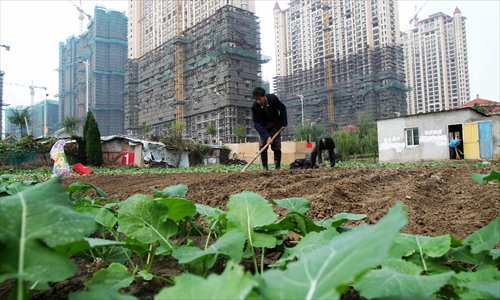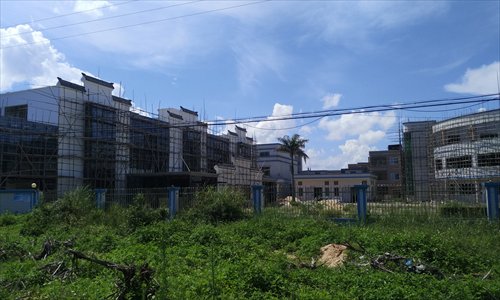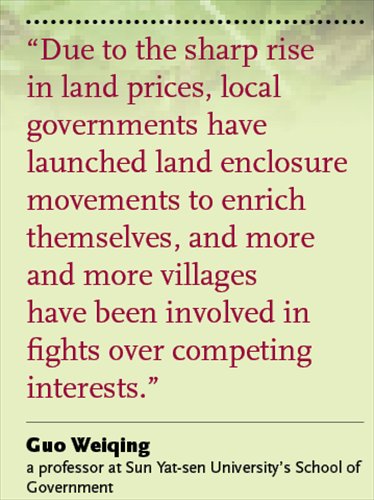Wukan disputes highlight conflict of interest at heart of rural development
Marchers carrying banners and slogans ringing in the air have come again to the streets of Wukan, a village under the city of Lufeng, an old revolutionary base for the Communist Party of China-led peasant uprising of the late 1920s. Angry over what they say is inadequate compensation after land grabs, the villagers are protesting against the developers and the local government. Such land disputes are common in rural China. Experts say reforms of grassroots governance is the only way to avoid this problem reoccurring again and again.

Farmers plow land in front of a building development project in Nantong, Jiangsu Province on November 11, 2011. Photo: IC
Every day for the last month residents of Wukan, a fishing village in Donghai township under the city of Lufeng in South China's Guangdong Province, braved the scorching summer sun and protested the local authority's detention of their elected village head on June 17 and land grabs they say are illegal.
The Lufeng government has claimed village head Lin Zulian took kickbacks from a construction project and that they have helped the village recover nearly all the land which had been illegally handed over to developers. They held press briefings and sent officials to persuade villagers face-to-face, but their efforts have been in vain.
In a video played by the Shanwei government, which is above the Lufeng government, at a press conference on June 24, Lin admitted taking bribes.
The villagers believe that officials framed Lin and put him in custody to prevent the locally-popular man from leading the villagers in more large-scale protests over inadequate compensation which followed land seizures, and dispute the government's claim that all the land illegally seized has been returned.
They claim the land recaptured - about 5,000 mu (333 hectares) - is just one third of the land which has been lost. However, the Shanwei government argues that their land claims are based on a map from 1959 which doesn't reflect village boundary changes carried out in the 1970s.
Such disputes or conflicts over land grabs and missing compensation are common in China, especially in regions where the price of land has rocketed.
Residents of other villages in Donghai like Puchen and Longkou have also reportedly petitioned or protested against alleged illegal land grabs.
But Wukan and its 15,000 residents have gained the most attention, as they were thrust into the spotlight five years ago when locals kicked out their village committee and won the right to elect their own.
Profit
With 190 kilometers of coast and five ports, and sitting only an hour by high speed rail away from Shenzhen which has some of the highest house prices in China, Lufeng's land prices have grown astronomically, especially in Donghai township where the local government is building an economic development zone. Wukan lies at the southern tip of the zone.
Since Lufeng government offices moved to the zone in 2008, wide streets and other infrastructure projects have been completed. Investment has flooded in from real estate, factory and hotel developments.
Apartments in a residential community built in the zone by Country Garden, a major real estate developer, sell for over 4,000 yuan ($597) per square meter.
The average annual income of Lufeng's rural residents is 10,202 yuan, according to a 2015 city government report.
Seeing these rapid changes and hearing rumors that village and city officials earned millions from transferring land to developers, the villagers were outraged.
"So far, more than 10,000 mu (of Wukan's collectively-owned land) has been occupied by others in the past two decades. But we each only got 550 yuan in total as compensation," Wukan villager Li Aixiu said, complaints which were echoed by several other villagers.
When collectively-owned land is sold, each villager should get a share.
To protest these land grabs, thousands of villagers smashed the Wukan "border defense" station and police and officials' cars in December 2011. This won them the right to elect new village committee members whom they believed would get their land back.
But the new committee failed to meet their expectations. In 2013, three village officials were detained for receiving bribes, another one sought asylum in the US after leading villagers to block traffic and damage a private pig farm built on land allegedly given away illegally.
Several projects in Wukan have been suspended due to the land dispute.
To ease local anger, Lin Zulian, head of the village committee, made efforts to bring investment to reclaimed land and negotiated with the city government to get more land returned to village control.
In April, Lin approached Lufeng native Wu Ruiqiu, chairman of the Shenzhen Artlover Culture & Art Development Co., Ltd, about developing a tourism complex. The total planned investment was 2 billion yuan.
"The project has received a warm welcome from both villagers and the government," Wu told the Global Times. He says that either he will pay the village rent that will then be split among residents, or that the villagers will become shareholders in the business and be paid dividends.
Negotiations have been suspended following the disorder that erupted once Lin was detained, but Wu says that he still plans to cooperate with the village.
"I believe that as long as the land is used properly and transparently, and the villagers are fairly compensated, there will be no disputes," Wu noted.

Buildings that were meant to be part of a textile factory stand unfinished in Wukan due to the land dispute. Photo: Huang Jingjing/GT
No faith in local authority
The Global Times reporter reached out to several developers involved in the Wukan disputes, but interview requests were either ignored or rejected outright.
Huang Xianjia, an official with the Lufeng publicity department, said it is currently "not convenient" for developers to give interviews. Questions posed to the city government about the situation remain unanswered as of press time.
Disputes like the one seen in Wukan are common across China. In July 2015, scores of farmers in a village under the city of Rizhao, East China's Shandong Province, fought with their village head and his family over land grabs. In October 2014, hundreds of farmers in a village under Kunming, capital of Southwest China's Yunnan Province, interrupted the construction of a trade and logistics center and demanded higher compensation. The protest turned violent, with eight villagers and construction workers losing their lives, according to the Xinhua News Agency.
Village committee corruption is usually to blame for disputes, especially in Guangdong which pioneered the country's reform and opening-up.
The Xiasha community in Shenzhen established a limited company to administer its land in 1992. Huang Yingchao, a local official, directed the company. But in 2014, residents started to protest, accusing Huang of misappropriating funds obtained from land transfers, according to a report by China Business Journal in September last year.
"The dividends paid to each resident tripled to 25,000 yuan [in 2014] after group petitioning," a resident told the journal.
The local authorities audited the village land company and reported it was in the red even though it had taken in nearly 1.5 billion yuan since its foundation.
The villagers do not trust the audit and insist that money is still being kept from them. Apart from demonstrations, they continue petition online in the hope that higher-level authorities will intervene.
Similarly in Wukan, the villagers also claimed that they have no faith in the city government and that the dispute can only be settled by the intervention of the central government.
Zhang Jing, grass-roots governance researcher at Peking University, says that protest movements in rural areas often aim to get Beijing's support to counter lower-level governments.
"When local neighborhood officials get involved in business, conflicts of interest with villagers are inevitable, and their credibility will vanish," Zhang told the China Business Journal.

Separate politics and economics
Dang Guoying, an expert on rural development with the Chinese Academy of Social Sciences told the Global Times that "the government should regulate land transfers between villagers and developers, rather than directly get involved."
According to official figures, local governments earned a record high of 4.26 trillion yuan from land transfers in 2014, accounting for 56 percent of local public revenue. Last year, the number dropped to 3.36 trillion due to economic slowdown and falling demand.
"Due to the sharp rise in land prices, local governments have launched land enclosure movements to enrich themselves, and more and more villages have been involved in fights over competing interests," said Guo Weiqing, a professor at Sun Yat-sen University's School of Government, told the China Business Journal.
"Officials need to change their preconceptions and abandon the mode of land-based finance," said Dang. Last year, the State Bureau for Letters and Calls organized five trips to 30 provincial-level regions to push local governments to handle a total of 332 petitions, most of which were about land grab disputes.
Dang also suggests governments separate their political and business functions. As the central government has further loosened restrictions on what farmers can do with land assigned to them, more and more transfers not led by the authorities are occurring.
Nanhai district in Foshan, Guangdong piloted a new system in some of its rural and urban communities. In rural areas, the village committee elected by the villagers only takes charge of administrative affairs. A collective economic organization in which all villagers are vote-holding shareholders takes charge of all the village's collective business affairs.
This system has turned out to be effective and the district has seen a sharp drop in of land disputes. Now, Foshan is promoting the mode across the city.
To cool the situation in Wukan, Dang advised the local government to pay more compensation to the villagers. "That's a short-term solution, but the government might hesitate as it fears other villages would follow."
In the long run, he suggests Wukan follow Nanhai's example and reform its local governance so development progresses without conflict and benefits all residents.
Newspaper headline: This land is our land